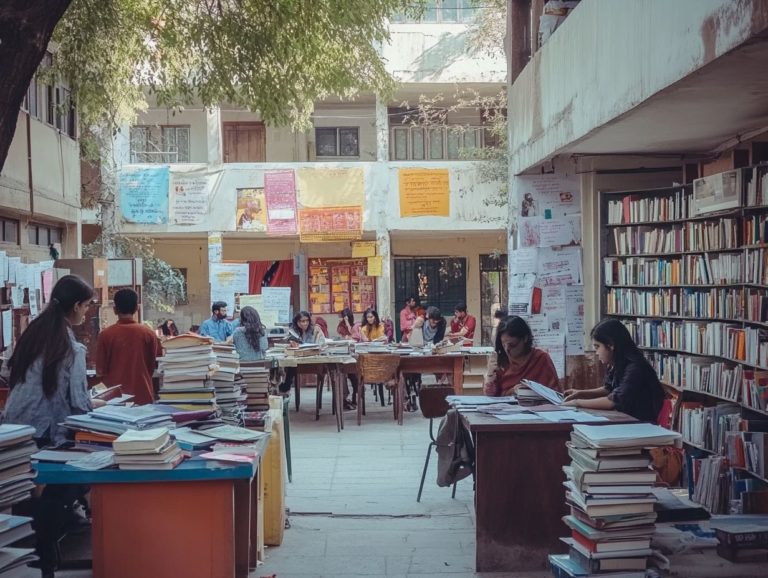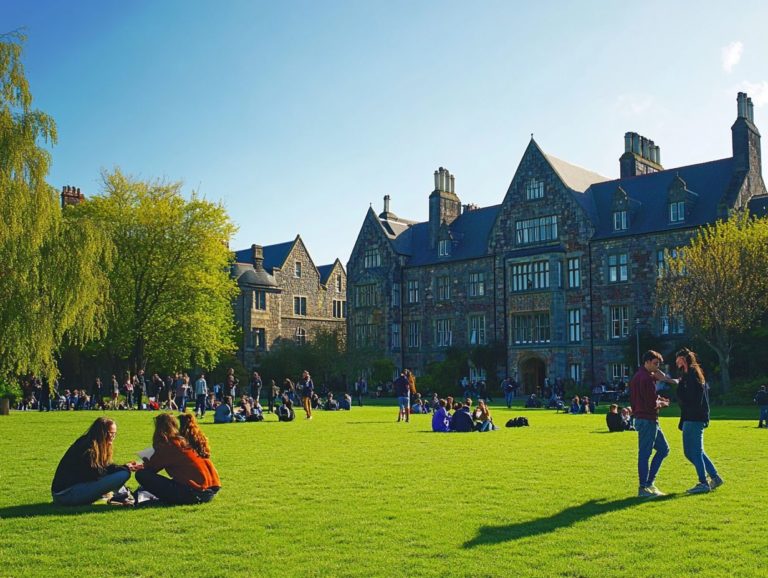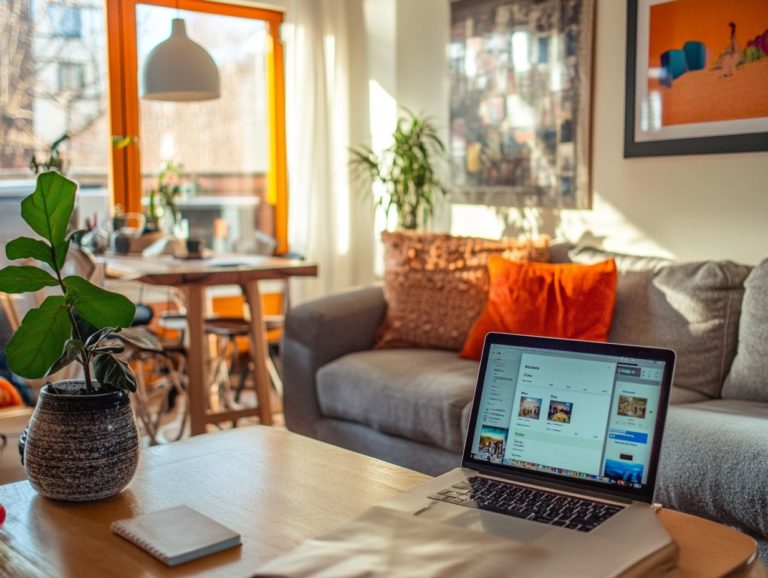5 Tips for Studying in the Philippines
Studying in the Philippines presents an exceptional opportunity to immerse yourself in a rich tapestry of culture, diverse educational offerings, and vibrant life experiences.
Whether you’re captivated by its esteemed universities or the breathtaking beauty of its landscapes, preparing for your journey is crucial. Get ready! Here are five must-know tips for a smooth transition, covering everything from understanding local customs to enhancing your study experience.
As you embark on this adventure, you’ll uncover the advantages of studying here, explore popular courses, and learn how to handle common problems. Prepare yourself for an experience that has the potential to shape your future in remarkable ways!
Contents
- Key Takeaways:
- 1. Familiarize Yourself with the Culture and Customs
- 2. Choose the Right School
- 3. Learn the Local Language
- 4. Be Aware of Safety Precautions
- 5. Take Advantage of Extracurricular Activities
- What Are the Benefits of Studying in the Philippines?
- What Are the Top Universities in the Philippines?
- What Are the Common Challenges Faced by International Students in the Philippines?
- What Are the Popular Courses and Fields of Study in the Philippines?
- How Can One Prepare for Living and Studying in the Philippines?
- What Are Some Tips for Making the Most out of the Study Abroad Experience in the Philippines?
- Frequently Asked Questions
- Here are the top 5 tips for studying in the Philippines!
- What is the best way to adjust to the culture and customs while studying in the Philippines?
- How important is it to create a study schedule while studying in the Philippines?
- What are the benefits of taking advantage of the country’s natural beauty and outdoor activities while studying in the Philippines?
- Why should I join a student organization or club while studying in the Philippines?
- Is it important to try the local cuisine while studying in the Philippines?
Key Takeaways:

- Familiarize yourself with the culture and customs to adapt better to your surroundings.
- Choose the right school to ensure quality education and a supportive environment.
- Learning the local language can enhance your experience and make communication easier.
1. Familiarize Yourself with the Culture and Customs
It’s important to understand the vibrant culture and customs of the Philippines as an international student eager to immerse yourself in your new educational journey. In vibrant Manila, where Filipino values intertwine with Spanish and American influences, you’ll witness a reflection of the country’s diverse history since 1898 and its evolution into a thriving Southeast Asian nation since 1946.
As you adapt to the local culture, you ll come to appreciate the unique blend of traditions, festivals, and breathtaking natural beauty elements that make the Philippines an irresistible destination for study abroad programs.
Jumping into local festivals, like the colorful Sinulog in Cebu or the lively Ati-Atihan in Aklan, gives you a front-row seat to the Filipino spirit of community and joy. Understanding local etiquette, such as using po and opo to show respect, will help bridge cultural divides and nurture friendships that extend far beyond the classroom.
Embracing these customs will not only enhance your academic experience but also deepen your connection to the local community.
Dive into the warmth of Filipino hospitality to create unforgettable memories and gain valuable insights into the values that shape this diverse society.
2. Choose the Right School
Selecting the right school in the Philippines is a pivotal step for international students, one that will profoundly influence your educational journey and overall experience in this culturally vibrant nation. Institutions like Reedley International School offer quality programs that cater to diverse student needs.
As you contemplate the ideal institution, a multitude of factors should be on your radar. Accreditation, or official recognition of a school s quality, is paramount as it guarantees the quality and recognition of degrees both locally and globally.
Evaluating program offerings is essential to ensure you can pursue your specific interests, whether they lie in the arts, sciences, or vocational courses. The school’s location also plays a significant role in shaping your daily life, providing either the buzz of urban excitement or the tranquility of natural beauty.
Robust student support services, including counseling and language assistance, can make your academic transition smoother and more enjoyable. It’s also beneficial to note that the academic year typically runs from August to May in the Philippines, allowing you to find enrollment periods that align perfectly with your needs.
Start preparing for your journey today!
3. Learn the Local Language
Learning the local languages, primarily Filipino and English, is essential for you as an international student in the Philippines. It makes communication smoother and helps you connect with locals, navigate daily life, and elevate your overall academic experience in a country that proudly embraces its Spanish heritage.
Grasping these languages unlocks a deeper understanding of the culture. It allows you to appreciate local traditions, customs, and nuances that might otherwise slip through the cracks of translation. For those eager to learn, a wealth of resources awaits you language courses at universities, online platforms like Duolingo or Babbel, and local immersion opportunities such as conversation exchange groups or cultural events.
Engaging with native speakers sharpens your language skills and helps you build friendships, enriching your time in the Philippines and fostering a more profound connection to its vibrant culture.
4. Be Aware of Safety Precautions

Being aware of safety precautions is crucial for you as an international student in the Philippines. This awareness enables you to enjoy your studies and the stunning surroundings without unnecessary risks while navigating the complexities of urban life in vibrant places like Manila.
Understanding and respecting local laws is essential. It helps you nurture a positive relationship with the community and avoid any unintended legal troubles. Exercise caution in high-risk areas, especially after dark, and keep yourself updated on current safety advisories. Maintaining a list of emergency contacts, including local authorities and your embassy, can provide peace of mind. Act now to ensure your safety and enjoy your time!
Your school often offers a wealth of resources, such as orientation sessions and workshops, designed to equip you with valuable knowledge and support networks. This helps you feel secure and ready during your time abroad.
5. Take Advantage of Extracurricular Activities
Engaging in extracurricular activities will help you develop essential life skills! These opportunities allow you to forge friendships and immerse yourself in the vibrant Filipino culture while studying at esteemed institutions.
You might find yourself participating in competitive sports, where teamwork and resilience become second nature, or joining cultural clubs that celebrate diverse traditions and foster understanding among peers. There are also ample volunteer opportunities that let you contribute to local communities, deepening your sense of belonging and empathy.
Workshops focusing on skills development or creative arts provide a platform for you to explore your passions and uncover hidden talents. Through these enriching experiences, you ll build lasting friendships and gain valuable insights into your surroundings, boosting your confidence as you navigate this exciting new chapter of your life.
What Are the Benefits of Studying in the Philippines?
Studying in the Philippines presents a wealth of advantages for you as an international student. You ll find an affordable education system, a variety of scholarship opportunities, and the chance to immerse yourself in a rich and vibrant culture all while being surrounded by the stunning natural beauty of the country, from pristine beaches to lush rainforests.
With lower tuition fees compared to many other countries, this destination becomes an attractive option for those like you who seek quality education without emptying your wallet. Academic programs here not only meet international standards but also foster innovative thinking and creativity. Engaging with local communities offers you cultural exposure, which means experiencing and learning about local traditions and lifestyles.
This journey will undoubtedly encourage personal growth and adaptability, essential traits in today s global market. The Philippines is also brimming with networking opportunities, connecting you with professionals and peers who could be invaluable for your future career paths all while you explore the breathtaking natural attractions the country has to offer.
What Are the Top Universities in the Philippines?
The Philippines boasts several top-tier universities that deliver high-quality education for international students. You’ll find a diverse range of programs and a nurturing learning environment, especially in urban centers like Manila and Cebu.
Among these esteemed institutions, the University of the Philippines shines with its robust offerings in social sciences and engineering. Ateneo de Manila University is celebrated for its business and law courses, consistently producing top graduates.
De La Salle University captures attention with its innovative teaching methods and strong emphasis on research. As an international student, you’ll benefit from a rich and diverse curriculum.
You will also immerse yourself in a vibrant cultural atmosphere that nurtures lifelong friendships and global connections.
The affordability of education and living expenses makes the Philippines an attractive option for those seeking quality education without breaking the bank.
What Are the Common Challenges Faced by International Students in the Philippines?

International students in the Philippines face various challenges. These include obtaining a student visa, managing housing costs, and adapting to a different educational system.
You might find adjusting to the culture a bit challenging, which can lead to feelings of isolation and homesickness. The academic expectations, including varying learning styles and grading systems, can also present significant obstacles.
To ease these challenges, immerse yourself in the local culture and engage with student organizations. Seek support from mentors who can guide you. Establishing a budget will empower you to manage financial constraints effectively.
Participating in language exchange programs can help bridge any linguistic gaps. By proactively tackling these issues, you can transform potential setbacks into enriching experiences that enhance your global perspective and contribute to your academic growth.
What Are the Popular Courses and Fields of Study in the Philippines?
The Philippines presents a captivating array of popular courses and fields of study that entice international students keen on pursuing business, engineering, and the arts. Educational institutions pride themselves on delivering high-quality programs that align with global standards.
Among these offerings, business administration, computer engineering, and interior design truly shine. These fields stand out due to their practical applications and robust industry connections.
Business programs immerse you in both local and international market dynamics, equipping you for the ever-evolving corporate landscape. In engineering, the focus on innovation and sustainability aligns with the rising demand for professionals in technology and infrastructure.
If you’re drawn to the arts, you’ll find ample opportunities to explore rich cultural expressions. You can hone your creative skills while tapping into the expanding market for design-related careers.
These courses not only pave the way for immediate job prospects but also provide a strong foundation for advanced studies. This allows you to specialize further and significantly enhance your employability.
How Can One Prepare for Living and Studying in the Philippines?
Preparing to live and study in the Philippines means immersing yourself in the local education system, understanding cultural nuances, and finding a good place to live. Additionally, you need to address practical matters such as housing costs, transportation, and managing your money in the local currency, Philippine Pesos. For those looking to enhance their experience, reviewing tips for effective study habits abroad can help ensure a smooth transition for international students.
To navigate this journey effectively, it s crucial for you to compile a comprehensive checklist of preparations. This should include:
- Apply for your visa early.
- Arrange suitable housing options that fit your budget.
- Familiarize yourself with the academic calendar to avoid any surprises.
Understanding local customs helps you fit in and will significantly enhance your social integration. Financial planning is just as vital; prioritize budgeting to manage tuition, living expenses, and daily costs. This way, you can fully enjoy your experience without the burden of unnecessary financial stress.
What Are Some Tips for Making the Most out of the Study Abroad Experience in the Philippines?
Make the most of your time by diving into the local culture, seizing networking opportunities, and seeking out extracurricular activities that will not only enhance your education but also create lasting memories.
This means immersing yourself in the vibrant Filipino lifestyle by participating in cultural events, connecting with locals, and indulging in the mouthwatering local cuisine. Joining student organizations offers a fantastic avenue to meet like-minded peers and cultivate friendships that could last a lifetime.
Exploring the nation s breathtaking landscapes from the pristine beaches of Palawan to the majestic rice terraces of Ifugao will deepen your understanding of this beautiful country. Engaging in local festivals provides unforgettable experiences that link you with community members and fellow travelers alike.
Caption: Explore the beauty and culture of the Philippines!
Frequently Asked Questions

Here are the top 5 tips for studying in the Philippines!
- Familiarize yourself with local culture and customs.
- Create a study schedule and stick to it.
- Explore the natural beauty and outdoor activities.
- Join a student organization for connections.
- Try various local dishes and flavors.
What is the best way to adjust to the culture and customs while studying in the Philippines?
Jump into the local culture by participating in community events, trying to speak the local language, and engaging with your classmates and professors.
How important is it to create a study schedule while studying in the Philippines?
Creating a study schedule is crucial when studying in the Philippines. With the country’s beautiful beaches and bustling cities, it can be easy to get distracted. Having a schedule will help you stay on track and manage your time effectively.
What are the benefits of taking advantage of the country’s natural beauty and outdoor activities while studying in the Philippines?
Taking advantage of the Philippines’ natural beauty and outdoor activities can provide a much-needed break from studying and help reduce stress. It can also be a great way to explore and learn more about the country’s culture and environment.
Why should I join a student organization or club while studying in the Philippines?
Joining a student organization or club can help you make friends, build a network of support, and get involved in campus life. It can also provide opportunities for leadership and personal development.
Is it important to try the local cuisine while studying in the Philippines?
Yes, trying the local cuisine while studying in the Philippines is a must! Not only is it a delicious way to experience the culture, but it can also be a budget-friendly option for meals. Don’t be afraid to try new foods and flavors.






